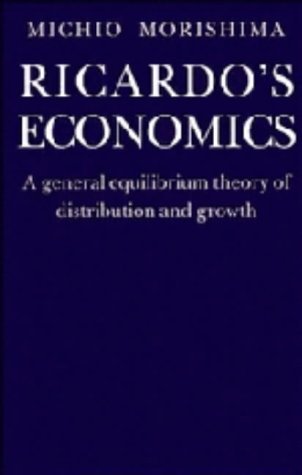Verwandte Artikel zu Ricardo's Economics: A General Equilibrium Theory...

Inhaltsangabe
This book, together with Marx's Economic and Walras' Economics, completes a sequence of titles by Professor Morishima on the first generation of scientific economists. The author's assessment of Ricardo differs substantially from the established views adopted by economists and historians of economic thought. While economists such as Pasinetti, Caravale and Samuelson have concentrated on macroeconomic interpretations of Ricardo, and historians of economic thought have emphasised his labour theory of value, Morishima takes a different course. In this book the author concentrates on Ricardo's main work, The Principles, and shows that his economics is the prototype of mathematical economies without the symbols and formulae. Morishima then translates Ricardo's economics into mathematical language to find a general equilibrium system (very similar to Walras') concealed within. The analysis also contradicts the conventional view that marginalism emerged in opposition to classical economics, showing instead that Ricardian analysis is firmly based on marginalist principles, using prices, wages and profits rather than labour values. The book ends with a discussion of the historical character of economic theory and an attempt to specify the epoch of Ricardian economics.
Die Inhaltsangabe kann sich auf eine andere Ausgabe dieses Titels beziehen.
Críticas
"...thought-provoking....Morishima challenges the conventional representations of the Ricardian system, but from a highly mathematical angle....His multi-sector model of an agricultural economy with different grades of land is a useful corrective to the simple agricultural production functions which have been used till now." Andrea Maneschi, History of Political Economy
Reseña del editor
This book, together with Marx's Economic and Walras' Economics, completes a sequence of titles by Professor Morishima on the first generation of scientific economists. The author's assessment of Ricardo differs substantially from the established views adopted by economists and historians of economic thought. While economists such as Pasinetti, Caravale and Samuelson have concentrated on macroeconomic interpretations of Ricardo, and historians of economic thought have emphasised his labour theory of value, Morishima takes a different course. In this book the author concentrates on Ricardo's main work, The Principles, and shows that his economics is the prototype of mathematical economies without the symbols and formulae. Morishima then translates Ricardo's economics into mathematical language to find a general equilibrium system (very similar to Walras') concealed within. The analysis also contradicts the conventional view that marginalism emerged in opposition to classical economics, showing instead that Ricardian analysis is firmly based on marginalist principles, using prices, wages and profits rather than labour values. The book ends with a discussion of the historical character of economic theory and an attempt to specify the epoch of Ricardian economics.
„Über diesen Titel“ kann sich auf eine andere Ausgabe dieses Titels beziehen.
EUR 6,09 für den Versand von USA nach Deutschland
Versandziele, Kosten & DauerSuchergebnisse für Ricardo's Economics: A General Equilibrium Theory...
Ricardo's Economics: A General Equilibrium Theory of Distribution and Growth
Anbieter: ThriftBooks-Dallas, Dallas, TX, USA
Hardcover. Zustand: Good. No Jacket. Former library book; Missing dust jacket; Pages can have notes/highlighting. Spine may show signs of wear. ~ ThriftBooks: Read More, Spend Less 0.95. Artikel-Nr. G0521366305I3N11
Anzahl: 1 verfügbar
Ricardo's Economics: A General Equilibrium Theory of Distribution and Growth
Anbieter: Ammareal, Morangis, Frankreich
Hardcover. Zustand: Bon. Ancien livre de bibliothèque avec équipements. Edition 1989. Ammareal reverse jusqu'à 15% du prix net de cet article à des organisations caritatives. ENGLISH DESCRIPTION Book Condition: Used, Good. Former library book. Edition 1989. Ammareal gives back up to 15% of this item's net price to charity organizations. Artikel-Nr. G-105-500
Anzahl: 1 verfügbar

